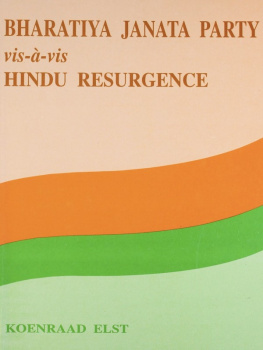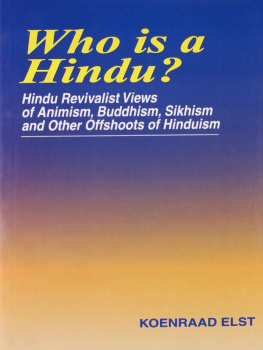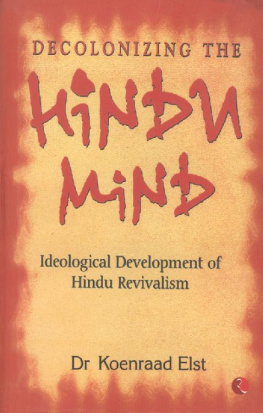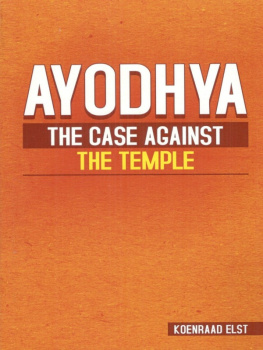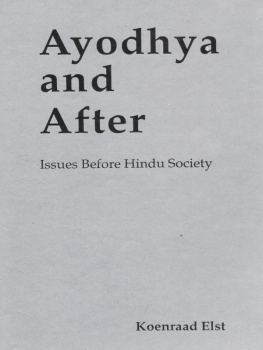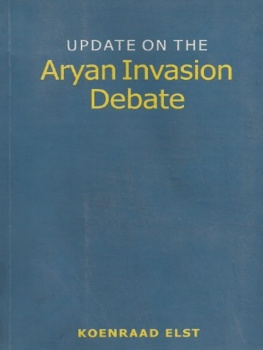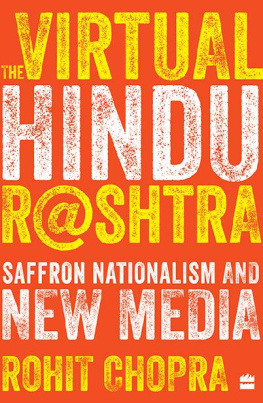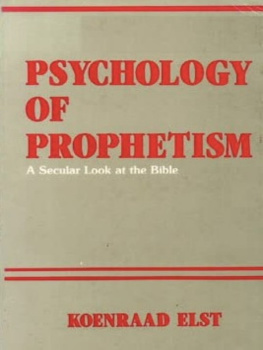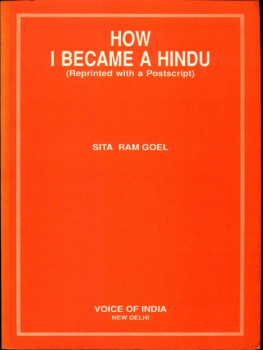Koenraad Elst - BJP Vis A Vis Hindu Resurgence
Here you can read online Koenraad Elst - BJP Vis A Vis Hindu Resurgence full text of the book (entire story) in english for free. Download pdf and epub, get meaning, cover and reviews about this ebook. year: 1998, publisher: Voice of India, genre: History. Description of the work, (preface) as well as reviews are available. Best literature library LitArk.com created for fans of good reading and offers a wide selection of genres:
Romance novel
Science fiction
Adventure
Detective
Science
History
Home and family
Prose
Art
Politics
Computer
Non-fiction
Religion
Business
Children
Humor
Choose a favorite category and find really read worthwhile books. Enjoy immersion in the world of imagination, feel the emotions of the characters or learn something new for yourself, make an fascinating discovery.
- Book:BJP Vis A Vis Hindu Resurgence
- Author:
- Publisher:Voice of India
- Genre:
- Year:1998
- Rating:5 / 5
- Favourites:Add to favourites
- Your mark:
- 100
- 1
- 2
- 3
- 4
- 5
BJP Vis A Vis Hindu Resurgence: summary, description and annotation
We offer to read an annotation, description, summary or preface (depends on what the author of the book "BJP Vis A Vis Hindu Resurgence" wrote himself). If you haven't found the necessary information about the book — write in the comments, we will try to find it.
BJP Vis A Vis Hindu Resurgence — read online for free the complete book (whole text) full work
Below is the text of the book, divided by pages. System saving the place of the last page read, allows you to conveniently read the book "BJP Vis A Vis Hindu Resurgence" online for free, without having to search again every time where you left off. Put a bookmark, and you can go to the page where you finished reading at any time.
Font size:
Interval:
Bookmark:
This book was produced in EPUB format by the Internet Archive.
The book pages were scanned and converted to EPUB format automatically. This process relies on optical character recognition, and is somewhat susceptible to errors. The book may not offer the correct reading sequence, and there may be weird characters, non-words, and incorrect guesses at structure. Some page numbers and headers or footers may remain from the scanned page. The process which identifies images might have found stray marks on the page which are not actually images from the book. The hidden page numbering which may be available to your ereader corresponds to the numbered pages in the print edition, but is not an exact match; page numbers will increment at the same rate as the corresponding print edition, but we may have started numbering before the print book's visible page numbers. The Internet Archive is working to improve the scanning process and resulting books, but in the meantime, we hope that this book will be useful to you.
The Internet Archive was founded in 1996 to build an Internet library and to promote universal access to all knowledge. The Archive's purposes include offering permanent access for researchers, historians, scholars, people with disabilities, and the general public to historical collections that exist in digital format. The Internet Archive includes texts, audio, moving images, and software as well as archived web pages, and provides specialized services for information access for the blind and other persons with disabilities.
Created with abbyy2epub (v.1.7.6)
Author
Published by Voice of India,
2/18 Ansari Road, New Delhi - 110002
Table of Contents
Introduction by Koenraad Elst
1. Anything but a Hindu Party
2. Equal Respect for all Religions
3. What is wrong with Hindu
4. The BJP Flag
5. How the Rama Card was Thrown Away
6. Sangh Parivar, The Last Gandhians
7. Gandhian Non-Violence
8. The Sanghs Anti-Intellectualism
9. The Sangh as Dinasaur
10. Anti-Intellectualism in Action 11.1 am a Hindu Communalist
12. Vulgar Nationalism
13. Hindu and Other Peoples Nationalism
14. The Sanghs Muslims
15. Party of Shopkeepers
16. Things to do for the BJP
17. Christ in India
18. Hindus Wielding The Sword of Islam
19. How Not to Deal with Islam
20. How to Deal with Islam
21. Know the Truth, and the Truth Shall Make You Free
22. Hindu Objections
23. Conclusion
Appendix I: A Reply to Kanchan Gupta
Introduction
Many people inside or close to the BJP, and inside or close to the broader Sangh Parivar, have become dissatisfied with what they perceive as the increasing distance between the BJP's actual policies and the Hindu expectations among the public on which the party capitalizes. To some extent, the problem lies with the BJP itself, distinguishing it from other Hindutva organizations, who then tend to blame the increasing non-Sangh element inside the BJP for this "degeneration", especially the opportunists who jumped onto the promising BJP bandwagon after the 1989 and 1991 electoral breakthroughs. To a large extent, however, the BJP problem is the RSS problem. In the BJP, the RSS approach is put to the test of day-to-day political practice, in confrontation with the enemies of Hindutva, without the benefit of the secretiveness which characterizes the functioning of other Sangh-affiliated organizations. Except for the recent defection and cormption scandals, the major failures of the BJP can be traced to RSS policies and RSS ideological conditioning.
At any rate, the problem is serious enough, even in the eyes of many BJP or RSS members, to warrant a frank debate. It is to this debate that the present paper wants to contribute. The prime focus of our attention will be the BJP's performance, but with constant reference to the RSS background. Most examples will be drawn from the one aspect of Hindutva politics which is by far the most conspicuous and the most common target of secularist criticism: the relation with Islam. Historically, the RSS was created in a context of Hindu-Muslim tension, and till today, its activists have frequently been in conflict with the Muslim community politically or even physically. An organization which has had to deal with India's Islam problem for more than 70 years may be expected to have developed a clear analysis of this problem, and an effective strategy to counter it.
Many Sangh Parivar activists are not going to like this paper. They have a childlike affection for the organization which has given them togetherness and solidarity, a feeling of purpose and of home. Often self-effacing idealists, they don't mind criticism of their own person, and they can listen to insults to India and Hinduism without being moved, but they are very touchy when it comes to criticism of the Sangh. I apologize to them for any hurt caused by this text, but I am convinced of its urgent necessity. The Sangh is benumbed by the decades-long crossfire of criticism by its enemies, but is not used to listen to criticism from friendly quarters.
On the other hand, a lot of Sangh people are going to agree with my remarks. It is pardy because of complaints from Sangh activists themselves that I have resolved to formulate this critique. Littie does the Sangh leadership realize that numerous idealistic volunteers have joined one of the many Sangh-affiliated organizations because they want to do something for Hinduism, not because they care about the specific Sangh outlook. The Sangh Parivar just happens to be around, just happens to be the largest organization reputed to be working for Hinduism, so Hindu-minded people join one of its fronts rather than go through the wasteful trouble of setting up their own rivalling shop; but that doesn't mean they are enthusiastic about certain Sangh fads which will come up for scrutiny in this paper.
The present text is a much-enlarged version of a two-part guest column published in the Observer of Business and Politics (Delhi) of 6 and 7 December 1996, and contributed at the suggestion of Mr. R.K. Mishra and Mr. Balbir Poonj. I thank them for their interest and for the courage of publishing that column, but of course they bear no responsibility whatsoever for its contents. Among all the Sangh people whom I should thank for giving me access to information, I want to mention Mr. K.R. Malkani and Mr. Devendra Swarup in particular. I hope they can appreciate the spirit in which I offer the comments which follow.
Koenraad Elst Leuven, 17 January 1997
1. Anything but a Hindu party
The strange thing about the BJP is that its voters consider it a Hindu party, its enemies denounce it as a Hindu party, but the party will call itself anything except a Hindu party.
Unlike most critics of the BJP, who tend to make their point by quoting sources openly hostile to the party, we should prove our case by going to its own formulations of its ideology. To summarize the ideological positions of the BJP and its former avatar, the BJS (Bharatiya Jana Sangh), from authentic sources, we will reproduce the brief professions of ideological commitment given in the Constitutions of the BJS (1973) and of the BJP (1992). The summary given in the BJS Constitution under the heading "Aims and Objectives in Brief', a programme to which all BJS party members pledged their loyalty, are as follows (we give it in its entirety, but change the order so as to group the different points under headings of our own making):
1) Cultural nationalism: "Political, social and economic reconstruction of the country on the basis of Bharatiya Sanskriti [= culture] and Maryada [= "limit", ethics]. Protection and promotion of the cow. Use of Hindi and other Pradeshic [= provincial] languages as official languages in their regions. Changes in the judicial system to suit the genius of India and fit in with present-day conditions."
Font size:
Interval:
Bookmark:
Similar books «BJP Vis A Vis Hindu Resurgence»
Look at similar books to BJP Vis A Vis Hindu Resurgence. We have selected literature similar in name and meaning in the hope of providing readers with more options to find new, interesting, not yet read works.
Discussion, reviews of the book BJP Vis A Vis Hindu Resurgence and just readers' own opinions. Leave your comments, write what you think about the work, its meaning or the main characters. Specify what exactly you liked and what you didn't like, and why you think so.

